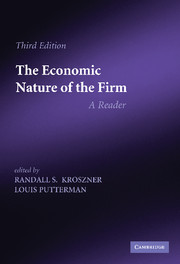Book contents
- Frontmatter
- Contents
- Editors' preface
- Reintroducing The Economic Nature of the Firm
- Part I Within and among firms: the division of labor
- Part II The scope of the firm
- 7 The nature of the firm
- 8 Vertical integration, appropriable rents, and the competitive contracting process
- 9 The governance of contractual relations
- 10 The limits of firms: incentive and bureaucratic features
- 11 Bargaining costs, influence costs, and the organization of economic activity
- 12 The boundaries of the firm revisited
- Part III The employment relation, the human factor, and internal organization
- Part IV Finance and the control of the firm
- References
- References
7 - The nature of the firm
Published online by Cambridge University Press: 05 June 2014
- Frontmatter
- Contents
- Editors' preface
- Reintroducing The Economic Nature of the Firm
- Part I Within and among firms: the division of labor
- Part II The scope of the firm
- 7 The nature of the firm
- 8 Vertical integration, appropriable rents, and the competitive contracting process
- 9 The governance of contractual relations
- 10 The limits of firms: incentive and bureaucratic features
- 11 Bargaining costs, influence costs, and the organization of economic activity
- 12 The boundaries of the firm revisited
- Part III The employment relation, the human factor, and internal organization
- Part IV Finance and the control of the firm
- References
- References
Summary
Economic theory has suffered in the past from a failure to state clearly its assumptions. Economists in building up a theory have often omitted to examine the foundations on which it was erected. This examination is, however, essential not only to prevent the misunderstanding and needless controversy which arise from a lack of knowledge of the assumptions on which a theory is based, but also because of the extreme importance for economics of good judgment in choosing between rival sets of assumptions. For instance, it is suggested that the use of the word “firm” in economics may be different from the use of the term by the “plain man.” Since there is apparently a trend in economic theory towards starting analysis with the individual firm and not with the industry, it is all the more necessary not only that a clear definition of the word “firm” should be given but that its difference from a firm in the “real world,” if it exists, should be made clear. Mrs. Robinson has said that “the two questions to be asked of a set of assumptions in economics are: Are they tractable? and: Do they correspond with the real world?” Though, as Mrs. Robinson points out, “more often one set will be manageable and the other realistic,” yet there may well be branches of theory where assumptions may be both manageable and realistic.
- Type
- Chapter
- Information
- The Economic Nature of the FirmA Reader, pp. 79 - 95Publisher: Cambridge University PressPrint publication year: 2009
References
- 8
- Cited by



